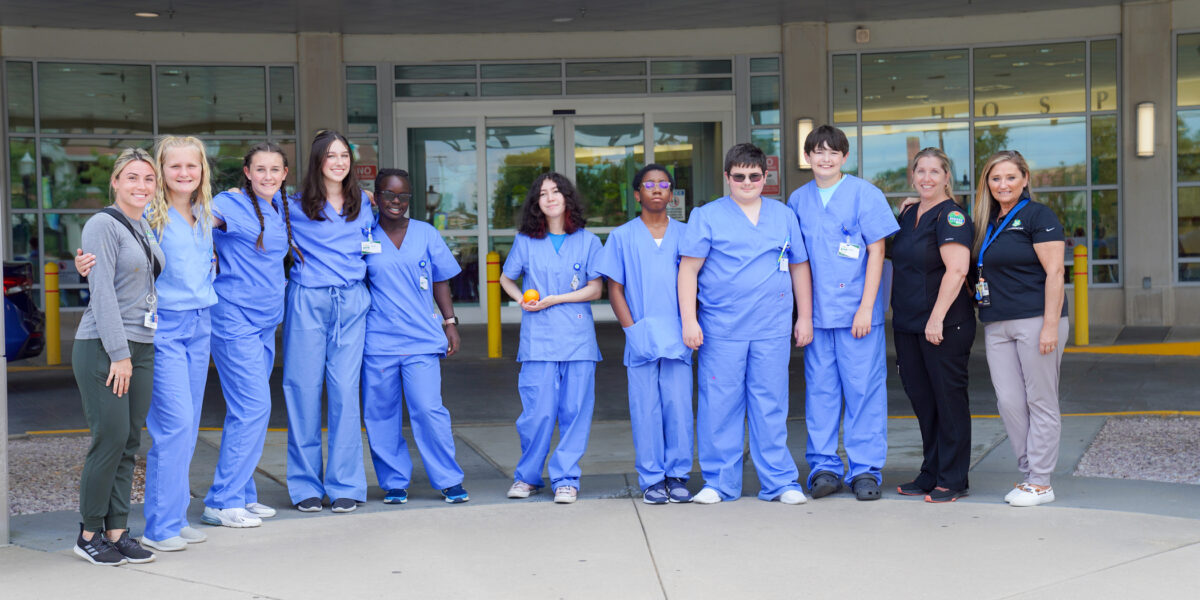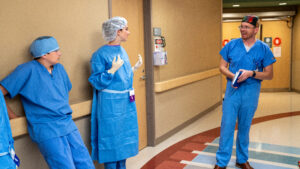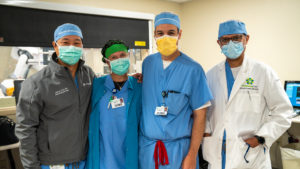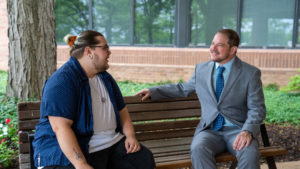For 12-year-old Michael Bilski, Camp Scrubs at Union Hospital really lived up to its name.
He and his fellow campers helped paint inspirational messages on the windows above the High Street walkway, then took turns delivering lunch trays to patient rooms.

After practicing their surgical skills by slicing into oranges with an electric scalpel and maneuvering pieces of laparoscopic equipment like a high-tech version of the game “Operation,” they dedicated a community rock garden near the hospital entrance.
Busy? Yes.
Interesting? Definitely.
Messy? Occasionally.
“This is why you wear scrubs,” Michael said with a laugh as he pointed at a splotch of paint on his leg.
What it means to be in health care
While some kids watch hospital shows at home, Camp Scrubs gives interested tweens and teens the chance to glimpse firsthand what it’s like to be a health care professional. Offered through a partnership with Cecil College and Union Hospital, the weeklong camp exposes students to career opportunities and helps them understand the important role of medical care within a community.

“This is the future of our workforce,” said Lisa Fields, a manager with Community Engagement at Cecil County campus.
“It’s an opportunity for us to give back to our community and really have support for our youth. This is their chance to look inside the walls and see what it means to be in health care.”

Until the start of Camp Scrubs, eighth-grader Miranda Sheriff had never been inside Union Hospital. She didn’t know anyone there, either.
By the end of the first day, she had made three new friends and held some of the tools used by doctors and nurses who help deliver babies. The next day, she visited the operating room, where nurses outfitted a cardboard box with plastic eggs, candy and small decorations and showed campers how to grab the prizes inside by maneuvering the laparoscopic pinchers with one hand while with gripping the tiny camera with the other.

It was like playing the claw game at an arcade — with one big difference.
“This can help me become a doctor because it makes you more familiar with the equipment that they use,” said Miranda, 13, who attends the Tome School.
‘More than just a hospital’
This year marks the first return of the camp to Union Hospital since 2019. Eight students signed up this summer, and Fields said she expects the camp to grow even more next year.

Katie Hunter, program coordinator for Community Engagement, said programs like Camp Scrubs help young people find out about potential careers while also shining a light on the love and excellence shown every day by Cecil County campus caregivers.
“It helps our community to see that ChristianaCare is more than just a hospital. Our caregivers are part of this small town, and we create these partnerships because we care about our community.”

Being a part of Camp Scrubs has given eighth-grader Brooke Bateman a chance to watch and learn from nurses as they do their jobs. Seeing them in action has convinced her that nursing is a viable career path for her, even if it’s not an easy one.
“It’s a really hard job, but I think that’s why I like it because I like doing hard things,” said Brooke, 13, who attends Immaculate Heart of Mary School in Wilmington.
She hopes the cheerful messages painted on the windows and in the rock garden help caregivers feel valued and appreciated for the work they do.
“It’s a reminder that what you’re doing here is important and that your work matters,” she said.
























